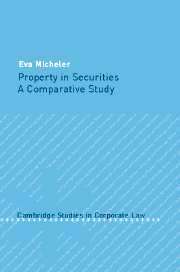Book contents
- Frontmatter
- Contents
- Preface
- Table of legislation
- Table of cases
- Introduction
- 1 Convergence and path-dependence
- Part I English law
- 2 Paper transfers
- 3 Dematerialisation
- 4 Impact on the institutional framework
- 5 Defective issues
- 6 Unauthorised transfers
- 7 Indirect holdings
- 8 Conclusions on English law
- Part II German and Austrian law
- Part III Conclusions
- Select bibliography
- Index
6 - Unauthorised transfers
from Part I - English law
Published online by Cambridge University Press: 28 July 2009
- Frontmatter
- Contents
- Preface
- Table of legislation
- Table of cases
- Introduction
- 1 Convergence and path-dependence
- Part I English law
- 2 Paper transfers
- 3 Dematerialisation
- 4 Impact on the institutional framework
- 5 Defective issues
- 6 Unauthorised transfers
- 7 Indirect holdings
- 8 Conclusions on English law
- Part II German and Austrian law
- Part III Conclusions
- Select bibliography
- Index
Summary
Introduction
When an asset is sold under English law, the buyer acquires title to the asset only if the seller has authority to sell the asset concerned. The risk of an unauthorised transfer is thus carried by the buyer, who is left to sue the transferor, who may not be in a position to satisfy a claim. The same general rule also applies when securities are transferred.
The general rule is supported by the principle that no one can transfer an asset she does not herself have. If the principle applied to transfers of securities without exception, all transfers of securities would necessarily involve the risk that the seller did not have authority to sell. The possibility that the risk materialises would be reflected in the purchase price a market buyer was willing to pay for already issued securities. The fact that the secondary market would apply a discount compensating for the risk of unauthorised transfers also reduces the price achievable by the issuer when securities are first issued.
Ideally, securities transfers do not involve legal risk of this type. The price of securities should not be deflated by transfer rules that create risk for market participants. England, like Germany and Austria, has developed rules that contain the risk of unauthorised transfers for the benefit of the buyer. The rules adopted by England, on the one hand, and by Germany and Austria, on the other, stand on different doctrinal bases. They nevertheless achieve a similar level of protection.
- Type
- Chapter
- Information
- Property in SecuritiesA Comparative Study, pp. 101 - 118Publisher: Cambridge University PressPrint publication year: 2007

